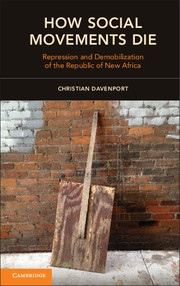1 - Killing Social Movements from the Outside or the Inside
Published online by Cambridge University Press: 05 December 2014
Summary
When we contemplate what we know about why social movement organizations (SMOs) are ended, we have to acknowledge rather quickly that we have just begun to scratch the surface on the topic (e.g., Edwards and Marullo 1995; Klandermans 1997; Nepstad 2004). As Koopmans (2004, 26) correctly summarized, “to date, the explanation of protest decline is perhaps the weakest chain in social movement theory and research.” Part of the reason for the difficulty in addressing the topic is that different scholars in sociology and political science use different labels to refer to the same phenomenon or, at least, seemingly related phenomena, for example, “decline” and “contraction” (Koopmans 2004), “(dis)continuity” (Taylor 1989), “termination” (Downton and Wehr 1991), “disbanding” (Minkoff 1993), “demobilization” (Edwards and Marullo 1995; Weinstein 2007; Humphreys and Weinstein 2007), “decay” (Jenkins 1998), “outcome” (Brandt et al. 2008; Lyall and Wilson 2008), “mortality” and “survival” (Edwards and Marullo 2004), and “decapitation” (e.g., Byman 2006; Cronin 2006; Jaeger and Paserman 2009; Jordan 2010; Price 2010).
I prefer the label demobilization, and I will use this to refer to (1) official termination and/or significant alteration of the formal institution engaged in challenging authorities; (2) departure of individuals (members) from relevant organizations – especially the founding and/or core members that participate most frequently; (3) termination of or significant reduction in dissident interventions (behaviors); and (4) a fundamental shift in the ideas of the challenger (particularities of the claim) away from what was earlier established. Although any of these on its own signals demobilization, normally several are present at the same time. In this chapter, I discuss the more prominent explanations of social movement demobilization and the results of rigorous investigations into the topic.
- Type
- Chapter
- Information
- How Social Movements DieRepression and Demobilization of the Republic of New Africa, pp. 21 - 37Publisher: Cambridge University PressPrint publication year: 2014

